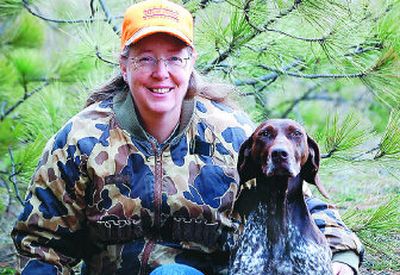Pointer holds her own in kennel of Labs

They were smiling at the podium of the Spokane Bird Dog Association’s annual banquet this winter, but their teeth were tightly clenched.
The officers for the retriever faction in the club were gracious but clearly chagrinned to give one of their highest annual North American Hunting Retriever Association awards to – a pointer.
Flack’s Gina Go Girl is a 3-year-old German short-haired pointer that defies stereotypes.
The dog is owned by Carol Ramsey, who works out of Colfax for the Washington State University Cooperative Extension. “I am her trainer and hunting partner,” Ramsey said. “She is my buddy.”
Ramsey shares a home with another buddy, Al Black, a dedicated retriever guy. That means Gina shares a kennel with three or four Labrador retrievers.
“I stick with the pointing breeds because I love to hunt with them,” Ramsey said.
But she also likes to keep the family together.
“I run NAHRA with my shorthair in lieu of other pointer hunting-testing events in the area since the remainder of the household is black Labs and they run NAHRA,” she said. “There are only so many weekends between hunting seasons.”
German shorthairs have long been recognized for their versatility in the field. Indeed, an Alaska musher ran a team of shorthairs to win an Anchorage-based sled-dog race in January.
But traditional dog handlers have some questions Ramsey was gracious to answer:
“Does retriever-training a German shorthair compromise the dog’s performance as a pointer?
Quite the opposite, Ramsey said. “Training for single and double marks adds significantly to Gina’s ability to find downed birds quickly and deliver them to hand.
“While chukar hunting this fall with two NAHRA “retriever” friends, she marked a chukar over 350 yards downhill and made a straight-line retrieve covering 600 vertical feet and delivering it to hand while we all watched saying ‘that is a lifetime mark.’
“Because of her NAHRA training, Gina is willing to pursue blind retrieves on land and in water to get to the area of a downed bird she did not see fall; again recovering birds more quickly and reducing the potential for lost game.”
“Are there any other spin-off advantages?
“NAHRA requires all dogs to be steady at the line and in hunting blinds. This pays off when I take Gina waterfowl hunting.”
“Do you handle a pointer differently than you would a retriever in a NAHRA event?
“One difference is that the retriever folks require their dogs sit to a ‘sit whistle’ when handling (casting). I whistle Gina to come to a standing stop (whoa) and then give hand signals.
“How does Gina make the transition from retriever-style events to being a pointing dog?
“She turns on the overdrive when we do any pointing-dog training compared to when we train for marks and blinds. She is responsive to whistles while quartering. For pointing-dog training, her points are staunch and she’s steady to shot.
“How do retriever trainers regard a GSP in their ranks?
Most NAHRA folks (especially outside judges) find it novel at the beginning, but I have been doing this since my first dog 12 years ago, so the regulars just chuckle at “stubby” (because of her docked tail).
Officially, however, Gina and other pointers could never make the top ranks of the retriever world.
“Non-retriever breeds and non-registered retrievers can run any licensed NAHRA Hunting Test by obtaining a Field Test Number. Dogs can qualify for ribbons, brass brands, club trophies, and for regional and national invitationals. However, only recognized ‘retriever’ breeds are awarded a NAHRA Title (Started Retriever, Working Retriever, or Master Retriever) since one of the NAHRA goals is to maintain a titled retriever registry.”
“Why didn’t you just go with a retrieving breed in the first place?
“Twelve years ago, I selected a pointer instead of a retriever for my first dog, Jaeger, since I was a beginner hunter and I wanted a dog to stop and tell me ‘Hey! I have a bird over here for you – pay attention.’
“This was even after being around Labs and in a household of labs; however both my GSPs were raised in a household of Labs, so retrieving was just part of being a puppy.”
“What’s your season like with such a versatile dog?
“Gina hunts with me from Sept. 1 until the closing of ducks and geese in January – grouse, quail, chukar, huns, pheasants, sharptails, geese, ducks. We train and trial March – August.
In other words, there’s no off-season when you live, train, compete and hunt with your buddies.